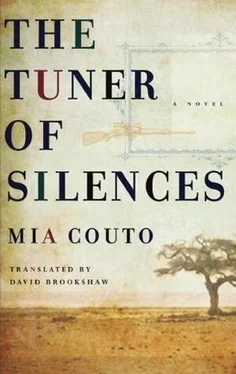— among all things, only a woman ages.
How will I open the window, if I’m not insane?
How will I close it, if I’m not a saint?
Adélia Prado
In Lisbon, when I announced that I was going to rescue my husband lost in Africa, my family abandoned its usual indifference. In the heat of the discussion, my father even went as far as to say:
— There’s only one way to describe these ravings, my dear daughter: they’re those of a jilted lover!
I was already weeping, but only noticed my tears at that point. My mother tried to keep the peace. But she reiterated her misgivings: “No one can save a marriage, only love can.”
— And who told you there’s no love?
— That’s even more serious: love is for whoever is beyond salvation.
The next day, I consulted the newspapers and scanned the classifieds. Before leaving for Africa, I had to make Africa come to me, in what is said to be the most African city in Europe. I would look for Marcelo without having to leave Lisbon. With that conviction, and with the paper opened at the classifieds, my finger paused on Professor Bambo Malunga. Next to the photograph of the soothsayer, his magic skills were listed: “He’ll bring back loved ones, find lost friends. . ” At the end, a note was added: “credit cards accepted.” In my case, perhaps it should have been a discredit card.
The following day, I walked down the narrow streets of Amadora carrying a bag full of the stuff stipulated in the ad: “A photo of the person, seven black candles, three white candles, a bottle of wine or spirits.”
The man who opened the door was almost a giant. His coloured tunic increased his bulk even more. I was uncertain about addressing him by his title when I introduced myself:
— I’m the one who phoned you yesterday, professor.
Bambo was from a part of Africa where the Portuguese hadn’t been, but he wasn’t put out: “Africans,” he said, “are all Bantu, all similar, they use the same subterfuges, the same witchcraft.” I pretended I believed him, as I walked past wooden statuettes and printed cloth wall-hangings. The apartment was cluttered and I took care not to tread on the zebra and leopard skins that covered the floor. They might be dead, but one shouldn’t step on animals.
Once he’d shown me to a little round stool, the soothsayer checked the things I’d brought and then noticed that I’d left something out:
— There’s no item of your husband’s clothing here. I told you yesterday on the phone that I needed a piece of his intimate clothing.
— Intimate? — I repeated blankly.
I smiled to myself. All Marcelo’s clothes were intimate, they had all brushed against his body, they had all been touched by my enraptured fingers.
— Come back tomorrow, lady, with all the materials required —the soothsayer suggested delicately.
Next day, I emptied Marcelo’s wardrobe into a holdall and walked through Lisbon carrying the bundle. I didn’t get as far as Amadora. Halfway, I stopped by the river and cast the clothes into the water as if I were emptying them onto the floor of the soothsayer’s consulting room. I stood there watching them float away, and suddenly, it seemed as if it were Marcelo adrift in the waters of the Tagus.
At that moment, I felt like a witch. First, clothes are an embrace that welcomes us when we are born. Later, we dress the dead as if they were leaving on a journey. Not even Professor Bambo could imagine my magic arts: Marcelo’s clothes floated like some prediction of our re-encounter. Somewhere on the continent of Africa, there was a river that would return my sweetheart to me.

I’ve just arrived in Africa and the place seems too vast to receive me. I’ve come to find someone. But ever since I got here, I’ve done nothing but get lost. Now that I’m settled in the hotel, I realize how tenuous my connection is with this new world: seven numbers scribbled on the back of a photograph. This number is the only bridge leading me to that other bridge I have to cross in order, perhaps, to find Marcelo. There are no friends, there are no acquaintances, there aren’t even any strangers. I’m alone, I’ve never been so alone. My fingers are only too aware of this solitude as they dial the number and then give up. Then, they dial again. Until a voice on the other end answers softly:
— Speaking?
The voice left me speechless, I was incapable of saying anything at all. My rival’s question was absurd: speaking? I hadn’t uttered so much as a word. It would have been more appropriate to ask: not speaking? Seconds later, the voice insisted:
— It’s Noci here? Who is this?
Noci. So that was her name. Up until then, the other woman was just a motionless face. Now, it was a name and a voice. A shudder returned my voice to me: I revealed everything all at once, as if I could only explain myself by blurting it all out. The woman remained silent for a moment and then, unperturbed, arranged to come to the hotel. An hour later, she introduced herself at the poolside bar. She was young, wore a white dress and matching sandals. Something broke within me. I expected someone of regal bearing. Instead, I was faced with a vulnerable young girl, her fingers trembling as if her cigarette were an unbearable weight.
— Marcelo left me. .
What a strange sensation: my husband’s mistress was admitting she’d been abandoned by my husband. Suddenly. I was no longer the betrayed woman. And we two strangers were being transformed into one-time relatives, sharing a common desertion.
— Marcelo went off with a married woman.
— He was involved with a married woman before.
— Here?
— No, there. It was me. And who is this new woman?
— I never found out. But in any case, Marcelo’s no longer with her. No one knows where he is.
She cupped her cigarette ash in her hand. It was the ash falling into her palm in this way that made me understand what she wasn’t telling me. I made an excuse to go up to my room. I said I’d only be a minute. But the tears I shed in that brief moment were enough for a lifetime.
I returned, having pulled myself together. Even so, Noci noticed my tortured look.
— Let’s forget Marcelo, forget men. .
— None of them warrants a woman’s sadness.
— Much less that of two women.
And so we sat talking about those non-existent things that women know so well how to endow with expressiveness. That woman’s loneliness hurt me, for she was hardly more than a girl. She chose me as her confessor, and for some time she complained that she’d suffered for being a white man’s lover. In public places, looks condemned her: she’s a whore! But she told me how her relatives had gone to the other extreme and encouraged her to get out of the country and take advantage of the foreigner. While Noci was talking, I still wondered to myself: if I saw her going into a bar with Marcelo, what would I say, what expressions of outrage would erupt from me? In truth, all I felt for that woman now was sympathy and warmth. For every occasion she had been insulted, I had also been affronted.
— So what do you do now, Noci?
To get a job, she had surrendered to the advances of a trader, the owner of a business. His name was Orlando Macara and he was her boss by day and lover by night. At the interview for the position, Orlando arrived late. Limping along like the hand on a clock and looking her up and down with a salacious grin, he said:
— I don’t even need to see your CV. I’ll take you on as a receptionist.
Читать дальше













